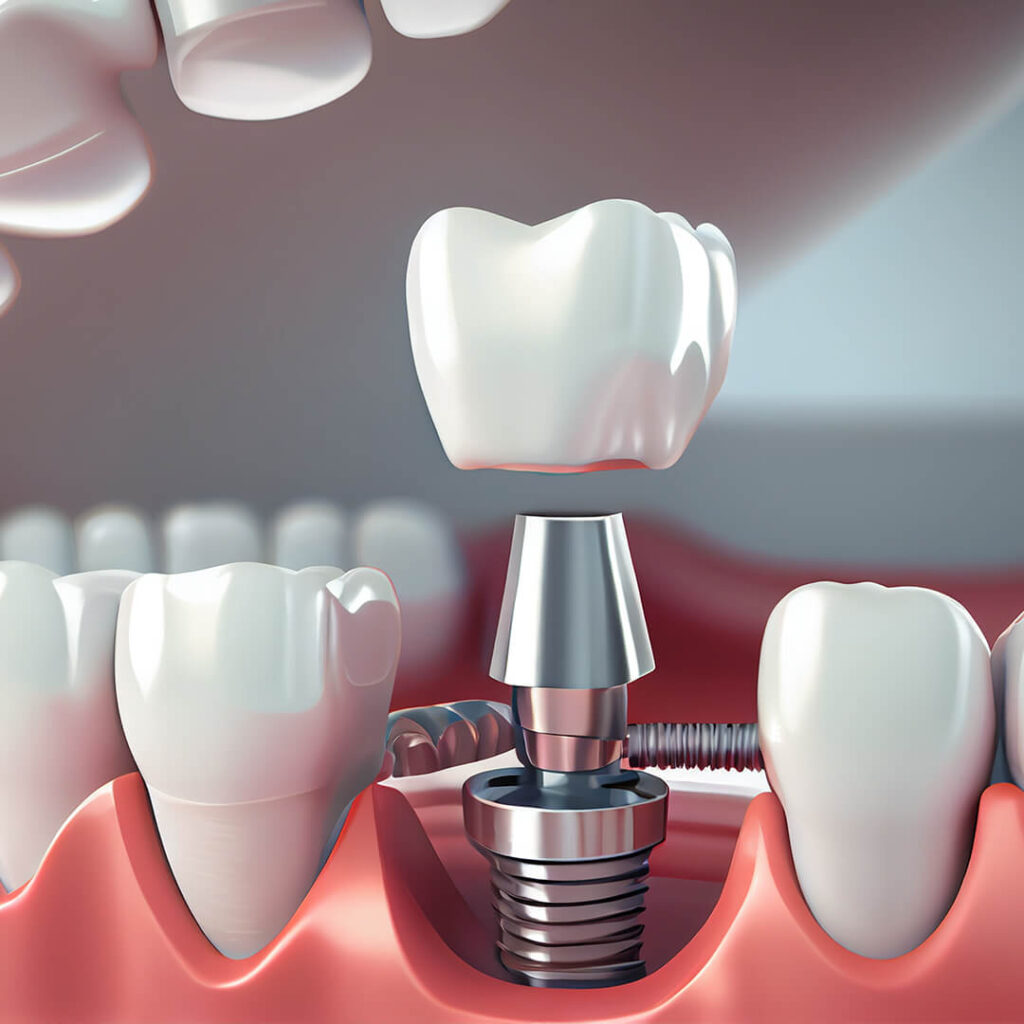Dental Implants
Dental Implants in Turkey

Understanding Dental Implants
Essentially, a dental implant is a titanium screw that is inserted through surgery into the jawbone. It works like a replacement root for a missing tooth. Over time, the implant merges with the bone via a procedure known as osseointegration and gives a stable base for a prosthetic tooth. The entire implant structure has three main components:
Implant: Like discussed, it’s the artificial root for the tooth that is surgically placed into the jawbone, where it goes through an osseointegration process.
Abutment: Following the implant’s appropriate integration into the bone, an abutment is fastened to it. It’s a small connector piece between the implant and the crown that sticks above the gum line to keep the crown in place.
Crown: This portion of the implant that is visible is created specifically to resemble the size, shape, and color of your natural teeth. That’s how it smoothly blends with the rest of the teeth. The material used in crowns is generally ceramic or porcelain to get a durable and pretty decent solution.
Types of Dental Implants (based on jawbone)
Endosteal Implants
The most prevalent kinds of implants are these ones, which are widely preferred because they are very stable and practical. A small surgery is done to insert them into the jawbone. They normally look like small screws or blades that are manufactured from biocompatible materials, such as titanium. They are good enough to hold one or more prosthetic teeth, so they are a versatile option for various restoration needs.
Key Features:
- Because the implant is inserted into the jawbone, it undergoes osseointegration and forms a solid base for the replacement tooth.
- It works effectively for replacing one or more teeth, supporting entire dentures, or both.
- Due to their property of blending into the jawbone, they have a high success rate and give results that last for years.
Procedure
- The first step begins with the dentist evaluating the patient’s oral health and jawbone thickness to confirm suitability.
- Next up is the implant’s surgical insertion into the jawbone.
- The healing period (implant integration with the bone) can take several months.
- Once it’s all merged, an abutment and crown are attached to the implant, and it’s all done.

Subperiosteal Implants
They are a good alternative to endosteal implants and are designed for patients who don’t have a healthy jawbone and cannot go through any bone augmentation procedure. Therefore, instead of the jawbone, subperiosteal implants are placed under the gum but above the jawbone.
Key Features
- These implants are placed under the gum line but above the jawbone with a metal framework for the necessary support.
- Insufficient bone height and strength is not a problem, and neither does the patient have to undergo bone grafting.
- The metal framework used in the process is custom-made for the patient’s jawbone, ensuring a secure fit.
Procedure
- The dentist will first check the patient’s oral health and gum tissue to decide whether they are a suitable candidate.
- They take an impression of the jawbone and gum tissue to create a tailored framework of metal.
- The prepared framework is then surgically positioned over the jawbone but under the gum tissue, as explained.
- Once those gums are healed, the prosthetic teeth are attached for use.
Aftercare and Recovery
After the implant surgery, individuals need to take proper care of their prosthetics for successful healing and long-term stability.
- Afterward, patients may experience mild discomfort or pain that can be managed with pain relievers prescribed by the dentist.
- To avoid placing excessive pressure on the implants and the jaw, it’s recommended to be on a soft diet initially and then graduate to hard foods.
- It’s necessary to maintain the best oral hygiene to not face any infections and promote healing. Brushing, flossing, and mouth rinses are a must.
- Never skip any follow-up visits with the dentist so they can monitor your healing progress and catch early if something’s wrong.
- It’s also advisable to stay away from smoking and excessive drinking of alcohol to not hamper healing.


Types of Dental Implants (based on the number of teeth replaced)
Single-tooth implants
These are an excellent solution for those with a single missing tooth. A titanium implant post is surgically inserted into the jawbone as an artificial root, and once it blends with the bone, a customized crown is attached to it to restore the look and function of the natural tooth. This method has many advantages, like the protection of adjacent teeth because they’re not grinded down for the process.
Plus, the implant prevents any bone loss and maintains facial structure. As a result, you get a strong and durable replacement that blends seamlessly with existing teeth. Patients get improved chewing ability and newly gained confidence in their smile.
Multiple Teeth Implants
It’s a very effective solution for patients who have many teeth missing. Instead of an implant for each missing tooth, a few implants are set very smartly to support a fixed bridge or multiple prosthetic teeth. There is a lot of stability and utility with this strategy. Since the implant posts are placed into the jawbone, they offer a safe foundation for the bridge. The teeth are now prepared for speaking and chewing, in addition to having a natural appearance. Also, there are no drawbacks to traditional dentures like slippage or discomfort.
Full-Mouth Mouth Implants
Also known as a full arch replacement, these implants are best for those who need to replace all teeth. It could be either the upper or lower jaw and involve placing multiple implants for a sturdy foundation for a whole set of prosthetics. Patients get unmatched stability and functionality, unlike classic dentures. The implants support the jawbone and maintain facial structure. They are built to fit comfortably and appear natural, so patients can eat, speak, and smile properly. The full-mouth dental implant cost also varies for each patient and their condition.
Factors Influencing the Cost of Full Dental Implants
There are many factors that can influence the expense one bears with dental implants, which include:
- Number of implants: The cost will increase with the number of implants you require.
- Location: The city or country you are based in will also affect the final cost.
- Expertise of the dentist: If the professional is highly experienced and specializes in their field, they will obviously charge more for their services.
- Type of prosthetic: The cost is also influenced by the material and quality of the crowns or dentures being used.
- Additional procedures: In case you need extra work like bone grafting or sinus lifts done, this will also increase the total cost.
Benefits of Dental Implants Over Other Tooth Replacement Options
How are the implants better than replacement options? Let’s check out the advantages of dental implants over dentures and bridges:
- Durability: We’ll start with the fact that dental implants are designed to last many years and, if taken properly care of, a lifetime. Conversely, dentures are a long-term solution that may require replacement or adjusting over time.
- Functionality: Nobody wants to stop eating. Thanks to implants, your full chewing abilities are not disturbed, and you can eat all that you like without any discomfort. The prosthetics are similar to your actual teeth.
- Aesthetics: We have established how dental implants seem and feel precisely like your natural teeth. The crowns are specially crafted to match the specifications of your existing teeth, thereby enhancing your smile.
- Bone health: Implants support the jawbone, so there’s no bone loss that typically happens with missing teeth. The bone’s density and strength are preserved, as are the natural structure and look of your face.
Cost Comparison: Dental Implants vs. Other Tooth Replacement Options
Dental implants are normally more expensive than traditional tooth replacement options such as dentures or bridges. The upfront cost of the dental implant process first includes the cost of the implant itself, the surgery, and the construction of the prosthetic tooth/teeth. But this expense won’t hurt because you know they offer long-term value.

Longevity: Dental implants are designed to be sturdy and durable, so they normally last a lifetime, but they do need proper care and maintenance. On the other hand, dentures and bridges could need replacement every 5–10 years. Implants are surely a permanent solution.
Cost of maintenance: With implants, there’s just minimal maintenance involved. If you brush and floss religiously and don’t skip dental check-ups, these implants will stay like rocks. In the case of dentures, they may require adhesives, specific cleaning solutions,and adjustments from time to time. Bridges also use additional dental visits.
Financial point: Yes, the initial cost of implants is usually higher, but given the durability they offer, the price makes sense. Dentures and bridges have recurring issues that could be annoying. Implants are like an investment that offers peace of mind and is a permanent option.
Success Rates and Longevity
Dental implants have a very impressive success rate and can last forever with proper maintenance.
- Dental implants have a whopping success rate depending on factors like the patient’s health, oral hygiene, and, of course, the skill of the professional who did implanting.
- These implants have a 20-year or longer lifespan if proper oral care and routine dental examinations are followed. It’s like the rest of the lives of most patients.
- As said, regular dental visits can’t be skipped for cleanings and checking the implant’s health.
- Keep in mind that smoking, uncontrolled diabetes, and poor oral hygiene work negatively and decrease the lifespan of implants.
Before and After Dental Implants
Before getting implants, patients face a lot of challenges because of missing teeth. They find it hard to chew and speak, and they also lack confidence about how they look. Missing teeth also cause oral problems. It could be the start of jawbone loss, the remaining teeth getting misaligned, or a change in facial structure. All this could be very heartbreaking to see.
However, once the patients get the dental implants, they see a drastic improvement in both function and appearance. Dental implants nicely support replacement teeth, and they look like natural teeth only. Patients can now eat almost whatever they want comfortably and speak more clearly. Plus, these implants hold the jawbone and stop loss from happening. The overall result is very satisfactory, and patients can enjoy a beautiful smile and a regular life.
Denture Implants
Denture implants, also known as implant-supported dentures, combine the advantages of implants and dentures. So, implants give a nice and secure foundation to the dentures and this prevents slippage. Hence, more comfort and better function. This method is really beneficial for those who are not at ease with traditional dentures.
Initial Consultation and Assessment
The process starts with a thorough and appropriate consultation. The first visit is actually the most important because here, the professional will evaluate your oral health, take detailed images of your gums and mouth, and also discuss your medical history. It’s this dental examination that will decide if you are good to go with the implants.
Preparation and Planning
If you come out as a suitable candidate, congratulations! You will get those amazing implants. Now, the next step involves detailed planning, where a customized treatment plan will be created that determines the number and placement of implants. Some cases might also need bone grafting or other prep work to make sure there’s enough bone for implants to be placed; otherwise, the treatment won’t be as effective.

All-on-Four Dental Implants
This is a very innovative method where the entire arch of the teeth is replaced using only four implants. Brilliant, right? This method makes the most of the available bone, and the implants are pretty smartly placed to provide enough support for the prosthetic dental arch.
Benefits
- Fewer implants: Since only four implants are enough to support a full arch, this simplifies the procedure and reduces the cost.
- Immediate results: Usually, the implant surgery and temporary tooth attachment occur on the same day. This offers immediate improvement in looks and function, and the patient starts getting used to it.
- Bone protection: The strategic angled placement of implants uses the thicker bone in the jaw, so there’s no need for bone grafting.
The procedure
- Consultation and Planning: This step is similar to the standard implant procedure and involves a detailed oral examination and planning of what needs to be done.
- Surgical placement: Then comes the part where the four implants will be placed in the jawbone. Usually, two are set at the front and two at the back at an angle.
- Temporary teeth: The patient gets a temporary set of teeth to carry on with the normal function of eating and speaking during the healing period.
- Final prosthesis: After the implants have fully blended into the jawbone, a permanent set of teeth is created and attached for a natural-looking permanent solution.
Eligibility for Getting Dental Implants
Those with missing teeth can opt for dental implants for replacement as an excellent solution, but not everyone is suitable for them. The eligibility for this procedure depends on these factors:
General health: Those who want to get these implants must be overall fit. If you have any chronic problems like uncontrolled diabetes, heart disease, or autoimmune disorders, avoid getting them treated, as they can affect healing.
Oral hygiene: Implants can’t be successful without good oral health. If you have dental decay or gum disease, you should get treatment before getting implants. Sufficient bone density is also required to support the jaw; otherwise, grafting will be required.
Lifestyle: Smoking is harmful enough to hamper the healing process and take the route of failure. Patients are therefore advised to quit before the procedure, and the same applies to excessive alcohol consumption and poor dietary habits.
Age factor: Young patients are normally not recommended implants as their jawbones are still growing. Nonetheless, as long as the patient is healthy and has appropriate bone structure, there is no upper age limit.
Financing Options
There are multiple financing options that can help with getting the implants:
- Insurance coverage: You can find and opt for dental insurance plans, as they cover a part of the cost, especially if medically necessary. It’s a big relief.
- Payment plans: Many good dental clinics also offer financing options or part payments so patients can manage the expense over time.
- Dental tourism: Traveling abroad to countries like Turkey for dental implants is a good idea as you get affordable treatments.






Dental Implants in Turkey
Turkey has been drawing a lot of attention from patients from around the globe to get their dental work done. Here, you get top-notch dental care at a very low cost compared to developing nations. Especially if we talk about dental implants, you will come back flaunting a wide smile.
Cost benefit: One of the biggest reasons patients get their implants from Turkey is because they get to save money. Dental treatments here are often 50–70% cheaper than in Western countries, and there is no way there will be any compromise on quality.
High standards: The dental clinics in the country always maintain best-in-class standards of care, follow international guidelines, and work with the latest technology and techniques. The facilities are all equipped, so patients have their expectations met.
Experienced dentists: Many Turkish dentists are highly trained and deliver global-level work. Several of them have studied and trained in Europe or the United States and are very expert at what they do. Patients can trust their expertise in getting the best treatment.
Comprehensive Packages: Since Turkey has a lot of dental tourism, mostly foreign patients come in to get their teeth fixed, and for their convenience, many dental clinics offer complete packages that cover everything like accommodation and transportation. Patients enjoy a smooth and stress-free experience because now they don’t need to manage various aspects of their trip on their own.
Choosing a Dental Implant Specialist
Selecting the dentist or implant professional is very important for the success of the procedure, therefore. It needs an extremely careful selection, and the tips below can help:
- Experience: Always opt for a professional who is highly trained in implanting because you don’t want any complications during or after the process.
- Patient reviews: Read reviews on whichever sites are possible to get an idea of the patient’s experiences with the dentist and the clinic.
- Technology: It’s advised to choose a clinic that has advanced technology present there for meticulous planning and successful placement of the implant.
- Communication: A good dentist will always take the time to explain the procedure and answer all your questions, so you are at ease throughout.
- Certifications: You must verify that the dental clinic follows industry standards, is certified by appropriate dental associations, and does not risk your treatment.

Future Trends in Dental Implants
With the latest technology, techniques, and materials coming in, the field of dental implants continues to get better.

- Digital dentistry: It includes more use of digital technologies like 3D printing and computer-guided surgery to get more precision in work.
- Biomaterials: Coming up with a lot better implant materials for faster healing, reduced irritation and sensitivity, and good enough blending with the jawbone.
- Customization: personalized solutions that are specially designed for the patient’s anatomy and preferences.
- Minimal invasion: Researching methods to bring down the discomfort as much as possible so the entire process is tolerable.
Dental implants stand out as the best option for tooth replacement, especially because of the long-term value they provide and how they work and feel, just like natural teeth. The patients are more confident after regaining their smile, and of course, they can now enjoy eating their favorite foods and talk properly. It’s a very practical investment. Getting this promising treatment done in a country like Turkey is like a double win. Choose a lasting solution for a confident and radiant smile!



